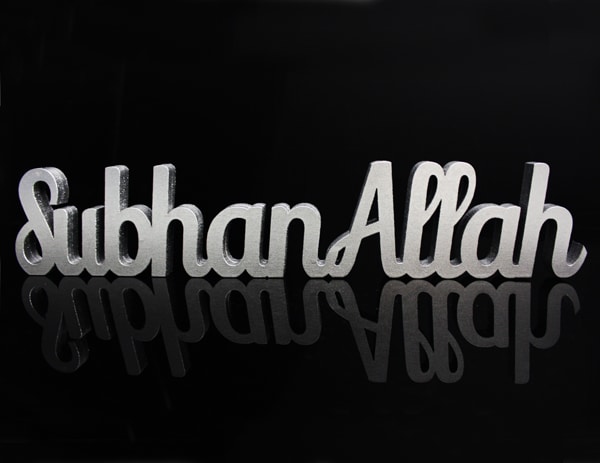Although the phrase Subhanallah also known as Subhan Allah—has no specific equivalent in English, it can be translated as “God is perfect” and “Glory to God.” Praises God or exclaims amazement at His characteristics or bounty are common uses of this word. For example, “Wow!” can be a simple exclamation. When Muslims say “Subhanallah,” they proclaim Allah’s transcendence and exalt him beyond any imperfections or inadequacy.
when to say Subhanallah
Subhanallah can be used as tasbih at any moment and for any purpose. However, when used in the proper context, it’s typically used to express wonder and enjoyment.
Dhikr, or remembrance of Allah, is the first occasion. There are no constraints on when or how this can be done.
Experiencing a magnificent event or a miracle is an additional reason to be grateful. For example, when all you see at night is the light from the stars, you suddenly realize how little you are in relation to the vastness of the cosmos. Then you’d mutter, “Subhanallah,” to yourself.
“Stop and smell the roses,” as the adage goes.
We learn to take the beauty of this Dunya for granted as we become older. Taking a moment to “stop and smell the roses” is the best way to appreciate the beauty of Allah’s creations. Fabi alai ala I rabbikuma tukazziban, “Then which of your Lord’s blessings would you both deny?” is repeated in the Qur’an’s Surah Ar-Rahman. a reference to the numerous gifts Christ has bestowed upon us.
Seeing a lovely flower on a trek is an occasion to exclaim “Subhanallah.” You’re expressing gratitude to your Creator in this way.
As Muslims, we use the phrase “subhanallah” if we’re taken aback by anything that’s out of the norm or unexpected. According to tradition, the Prophet Muhammad once passed Abu Hurairah, a friend of his, but the latter turned aside and abandoned him. When he returned, the Prophet inquired of Abu Hurairah, “Where were you?” According to his response: “I was junub and then took a bath, because I do not want to be with you in a state of junub” In response to Abu Hurairah’s behavior, the Messenger of Allah stated, “Subhanallah… verily a believer is not unclean”. According to the narrator Bukhari Muslim,
Subhanallah meaning
It is derived from the Arabic root word Subhan, meaning “to immerse yourself in something.” To understand Subhanallah’s deeper meaning, it is helpful to know that it refers to Allah as a vast ocean and absolute dependence on him, sustained by the sea.
The expression “Subhanallah” can also imply “May Allah be raised” or “May Allah be free from any deficiency.”
“Or have they a deity other than Allah? Subhanallah [exalted is Allah above] whatever they associate with Him.” (Surah Al-Isra 17:43)
The adjective “awe-inspiring” is most often used to express awe at the grandeur of nature rather than everyday luck or success. When admiring a breathtaking sunset, the expression “Subhanallah” would be suitable; yet, it would be inappropriate to express gratitude to God for a good test mark.

what does Subhanallah mean?
Although the phrase Subhanallah (also known as Subhan Allah) does not have a precise translation in English, it may be translated as “God is flawless” and “Glory to God.” This is a common phrase to utilize when worshipping God or expressing amazement at His traits, blessings, or creation. Alternatively, “Wow!” can be used as a basic exclamation. Muslims affirm Allah’s transcendence by praising him with the words “Subhanallah.”
SubhanAllah has no precise English translation or meaning. Therefore, all praise is due to Allah’s purpose is Allahu Akbar and Alhamdulillah, respectively.
When it comes to translating the word “SubhanAllah,” some have interpreted it as “May Allah be glorified” or “Allah is exalted,” respectively. In reality, SubhanAllah means “May Allah be uplifted,” “May Allah be free of what they ascribe to Him,” and “May Allah be free of any shortcoming.” These are the deficiencies that the disbelievers assign to Allah. It’s in this context that the word “SubhanAllah” appears in the Qur’an. Allah, for instance, says:
subhanallah alhamdulillah allahu akbar
Subhan Allah (Arabic: سبحان الله ) translates to “Allah is flawless.”
Al-hamdu lillah (Arabic: الحمد لله) means “All praise is due to Allah.”
Almighty Allah (Arabic: ‘Allahu Akbar’) is the Arabic phrase for “Allah Is Great.”
The Arabic phrase “La ilaha illallah” means “There is no god save Allah.”
subhanallah wa bihamdihi
Certain often repeated Allah-worship words in Arabic are frequently expressed dully. As a result, the translation might be dull and even baffling at times. On the other hand, the meaning in Arabic is profound, but it is lost in such translations. To highlight the difference, I sought to explain the true meaning of four such words in addition to their standard bland translations.
The four words in Arabic are tasbeeh, themed, Takbir, and table.
Subhan Allah: Allah is flawless in every way, with no imperfections or blemishes of any kind. “All thanks to Allah,” as it is commonly rendered.
Thank you, Allah: Because Allah is the Creator of everything, all praise and adoration must be directed solely at Him. To praise or thank something is to implicitly laud and thank Allah, the true Creator of that object. “All thanks to Allah,” as it is commonly rendered.
Allahu Akbar: Allah is more significant than anything, not just in your life but across the cosmos. “Allah is Great” is commonly translated as “Allah is Greatest.”
La ilaaha illa Allah: There is no other god worthy of worship except Allah alone, with no partners of any shape or kind. According to popular belief, there is no deity other than Allah.
When is it permissible to recite SubhanAllah, Alhamdulillah, Allahu Akbar?
Here are several strategies to keep your tongue moist by speaking these phrases repeatedly.
Recite these words before going to bed.
Follow the Sunnah and recite after Salah.
Recite it while traveling.
When you’re alone and doing nothing at the moment.
People occasionally have spare time at work. So this might also be the finest opportunity.
When you’re at home and want to unwind.
Recite these vital phrases as often as you can to proclaim Allah’s (SWT) grandeur anytime you find yourself free!
Allah (SWT) has blessed us abundantly with food, water, prosperity, good health, property, prestige, transportation, and much more… Shouldn’t we remember Him and praise Him for whatever we have?




Pingback: Subhanallah meaning in English. The virtues of saying Subhanallah